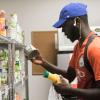Field to Fork: Hunting Groups Try to Appeal to Foodies
The Locavore
Charles Evans has never bought beef at a grocery store. “In fact, I’ve never bought beef outside of a restaurant. I’ve been eating venison my entire life for my red meat source,” he says.
Like many deer-meat eaters in Georgia, Evans gets his venison the old-fashioned way, by hunting. Every year, the state Wildlife Resources Division opens hunting season to permitted hunters across the state—the current season ends Jan. 14—but the number of people who hunt has dropped 20 percent over the last five or 10 years. That’s a problem, says Evans, because most wildlife conservation efforts going on across the country are funded by hunting and fishing.
“Keeping a deer population at a good level is paramount to keeping the ecological integrity of the landscape,” he says.
Evans, who works for the nonprofit Georgia Wildlife Federation, knew that the number of hunters would need to rebound and grow to sustain local conservation efforts. But the traditional population of hunters—older, rural—are aging out of the sport and not passing along the interest to younger generations.
Teaming up with Hank Forester from the Quality Deer Management Association, Evans began brainstorming ways to reach a new market, and they soon realized that the old-fashioned approach of hunting, of taking responsibility for harvesting your own meat, may appeal to locavores.
“We are trying to diversify as hunters,” Forester says. The people who go to farmers markets, who care about where their food comes from, he says, might see the value in hunting. The pitch is straightforward: Venison is one of the healthiest (free-range, antibiotic and additive-free) and most sustainable meats you can eat.
“They just haven’t had the avenue to pursue that presented to them,” Evans says. Hence, the creation of the Field to Fork program in 2016. Evans and Forester planned a short course where participants would learn about deer biology, hunting as a means of conservation and, of course, how to hunt. They set up a booth at the Athens Farmers Market that summer, and were pleasantly surprised by their reception. Almost everyone who walked by their booth, Evans says, tried some venison.
Eight people signed up that first year. Participants took two evening classes and later learned the basics of hunting with crossbows. Evans says he deliberately chose to stay away from guns. “There certainly is a stigma attached to guns, so we wanted to make sure that we had a tool that wouldn’t be intimidating to anybody.” Plus, he adds, crossbows are extremely effective when it comes to deer hunting.
Over one weekend, the group ventured out to Bogart to put their newly learned skills to the test on 20 acres of land owned by the QDMA. Learning to hunt locally, says Forester, was another important lesson for the group. Using local hunting land, rather than traveling all over the state, means participants are more likely to keep up the sport.
Once the group harvested—yes, harvest is the correct term—their deer, they learned to clean and prepare the meat. The program capped off with a potluck-style dinner that featured venison as well as other local game. As they enjoyed a meal together, Evans and Forester asked, what did you like best about the program? “We had quite a number of people say, the meditative component of sitting out in the woods, watching the woods wake up,” says Evans.
Forester says that’s why he’s glad to offer the program to local food lovers in Athens. “They want a connection with nature. They want to be responsible for where their meat comes from. They’re looking for sustainable food.”
Field to Fork hosted 10 participants in September and will launch its third program early next fall. Athens Farmers Market visitors can catch Evans and Forester at the Saturday market, or if you have questions about the program or hunting in Athens, contact Charles Evans at [email protected].













comments